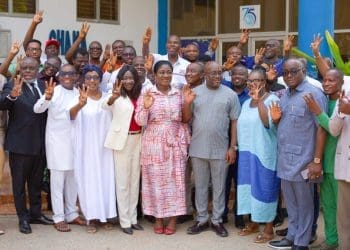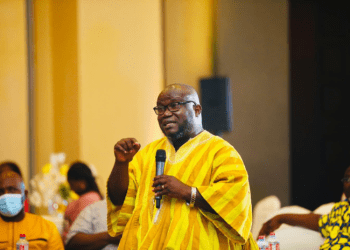The Ghana Catholic Bishops’ Conference (GCBC) has made a bold and urgent call on President John Dramani Mahama to declare a limited state of emergency in areas devastated by illegal mining, widely known as galamsey.
In a high-level meeting with the President at the Jubilee House in Accra, the bishops urged the government to temporarily suspend all mining activities in the worst-affected zones, deploy military engineering units to reclaim degraded lands, and restore lawful governance structures to the affected districts.
Galamsey now a national emergency
The call was led by Reverend Matthew Kwasi Gyamfi, Bishop of the Sunyani Diocese and President of the GCBC, who warned that the galamsey menace had evolved from a subsistence survival activity into a full-blown national emergency threatening the environment, the economy, and the moral fibre of Ghanaian society.

Rev. Gyamfi, who led a 20-member delegation of Catholic bishops to pay a courtesy call on the President, emphasised that while the visit was to congratulate President Mahama on his emphatic victory in the December 7, 2024, general election, the seriousness of the galamsey crisis could not be overlooked.
According to him, Ghana has lost more than 4,000 hectares of forest cover in just two years to illegal mining activities. He lamented that rivers such as the Prah, Offin, and Ankobrah, once lifelines of communities, have become symbols of ecological devastation and pollution due to unchecked mining.
But beyond the ecological collapse, the Bishop highlighted the deeper and more insidious social and moral destruction fueled by galamsey.
He said the disorder it brings in communities, the erosion of lawful authority, and the corruption of institutions had reached dangerous levels.
The country, he said, must act swiftly—not just with brute force, but with wisdom and sustainable planning.
While acknowledging that enforcement is necessary, he insisted that it must be paired with viable and credible alternatives for the thousands of desperate individuals who turn to illegal mining for survival.
Maximum national damage
Rev. Gyamfi underscored that the minimal economic benefits of galamsey were far outweighed by its long-term damage to the environment, to agriculture, to water resources, and to Ghana’s image as a responsible nation.
In addition to the call for a state of emergency, he proposed that all current mining activities in affected zones be halted and a national moratorium be placed on the issuance of new artisanal and small-scale mining licenses.
He called for the immediate repeal of legislative instruments that allow for the unchecked licensing of miners under the Minerals and Mining Act 2006 (Act 703), and a full audit and overhaul of the regulatory regime.

The GCBC further recommended the creation of district-level mining task forces composed of local authorities, civil society, and church representatives to monitor operations, report infractions, and involve communities in decision-making.
They advocated for independent environmental audits to be conducted on all current mining concessions, with the results made publicly available.
Rev. Gyamfi also called for the enforcement of mandatory reclamation bonds and the establishment of a national environmental restoration fund to be co-governed by the state, traditional authorities, and the Church.
The bishops did not stop at enforcement. They proposed practical solutions to wean communities off illegal mining by channelling parts of the Minerals Development Fund into training programs in agroforestry, aquaculture, ecotourism, and vocational education in mining-affected areas.
They also suggested that the government adopt blockchain technology to trace gold and mineral sources from extraction to export.
This, they believe, would reduce smuggling, enhance legal compliance, and significantly improve revenue generation.
Church pledges full support in galamsey fight
In his concluding remarks, Rev. Gyamfi pledged the support of the Catholic Church in the fight against galamsey. He expressed belief that if the nation could overcome this crisis, it would stand as one of the most important legacies of President Mahama’s tenure.
“Your Excellency, we, the Ghana Catholic Bishops’ Conference, are ready, ever ready, to be with you,” he said. “And we believe, if we’re able to salvage Ghana from galamsey, it probably might be the biggest legacy any president might have done for Ghana.”
In response, President Mahama thanked the bishops for their visit and their concern.
He assured them of the government’s resolve to tackle the illegal mining problem head-on.
Mahama noted that considerable progress had already been made in reclaiming forest reserves invaded by galamsey operators and reaffirmed his administration’s commitment to pursuing sustainable solutions to end the menace once and for all.
The bishops’ appeal has since resonated widely, with growing public calls for the President to act decisively.
For many Ghanaians, the destruction caused by galamsey has reached unbearable levels, and the bishops’ voice adds moral weight to what has become the most urgent environmental and governance crisis of the day.
Whether the government will heed the call to declare a state of emergency remains to be seen, but the pressure is clearly mounting—and the time to act, as the bishops warned, is now.













